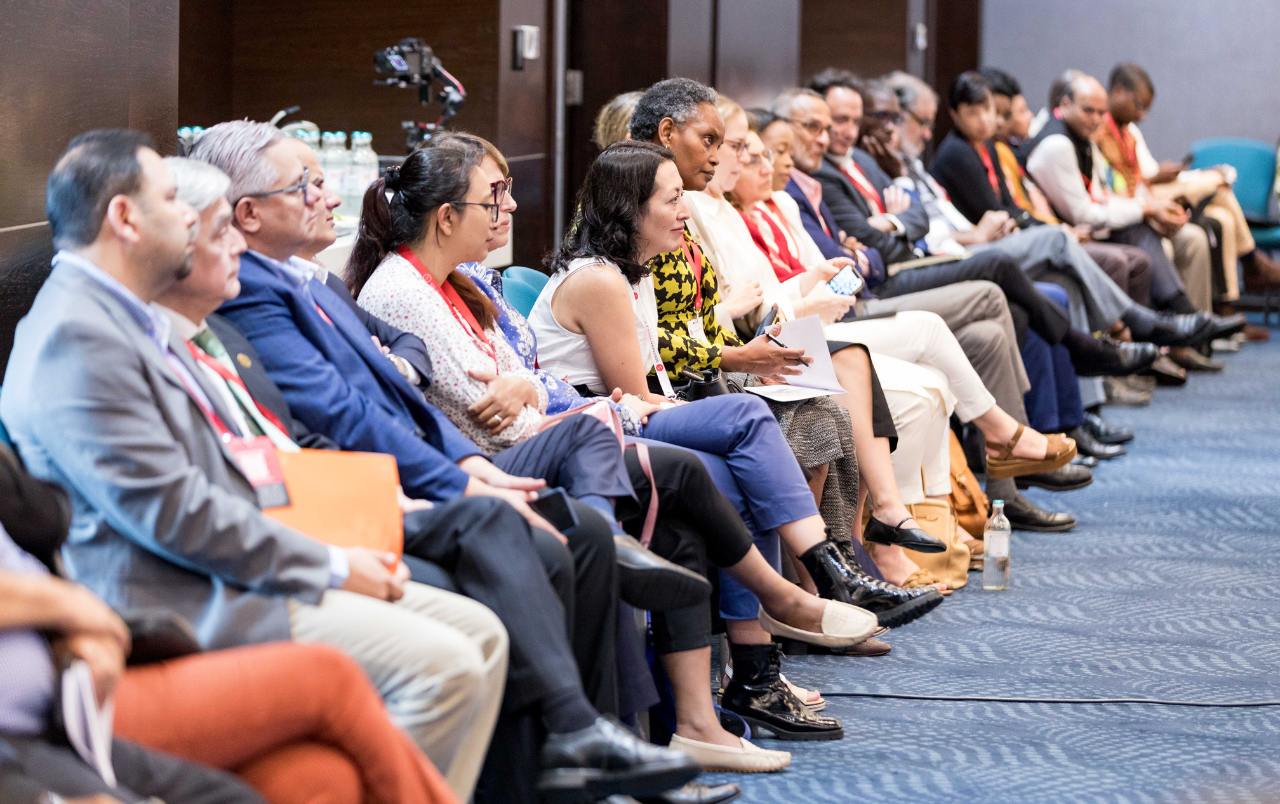Southern Voice will be hosting its landmark conference on the 24th and 25th of October 2023 in Nairobi, Kenya. It…
This past October, Southern Voice gathered members and partners in Nairobi, Kenya, to close our 10th anniversary celebrations with a landmark conference. We took the opportunity to discuss lessons learned in the past decade and explore what the future holds for development in the Global South. The conference was a space for members to share insights on global development issues, and what they need moving forward to continue to respond effectively. Facilitating collaboration among think tanks, maximising national and global impact and creating equitable partnerships across sectors and borders emerged as common themes. They also shared suggestions on how to improve the effectiveness and reach of development initiatives in the Global South, leveraging research that is evidence-based and locally-led.
Collaboration as the way forward
While the Global South is not homogeneous, we can definitely learn from one another to advance our collective mission. Think tanks’ leaders asked for more opportunities for collaboration and convergence, and expressed an appetite for exploring new models and methods for cooperation within our diverse network. They also stressed the importance of inter-regional collaboration among researchers based on issues of common interest. Working together will not only generate high quality research and policy content, but will increase the impact and visibility of this work in the global development space.
Increasing global impact
Our members showed eagerness to maximise the impact of the network internationally and of their own think tanks nationally. Conference sessions focused on the T20 process and on key moments of the UN political calendar and provided opportunities to flesh out new pathways for this in the coming years. Members expressed the need for more avenues to engage with such platforms, to exchange views and to learn from one another about increasing their spheres of influence. This is to ensure that efforts are directed towards addressing systemic global inequalities and imbalances of power.
Before the conference, a survey was shared with attendees to pinpoint areas of global development that need increased input from the Global South. Participants overwhelmingly identified climate change as the leading topic in which Southern perspectives are lacking. They also identified corruption, governance deficiencies and inequality as problem areas, where global discourse must integrate more expertise from the South.
Equitable partnerships in the national and global spheres
Across sessions, we saw questions about how partnerships can best support the objectives of our work as Global South think tanks. Some of this discourse focused on enhancing partnerships at the national level. Fostering stronger relationships with universities, for example, was suggested as a means to develop capacity. Building linkages with the private sector could enable think tanks to raise additional funds to support their activities and overall sustainability. Finally, participants expressed the need for working with youth for better future-forward initiatives.
Another key discussion addressed how international partnerships can be improved. Participants sought overall better coordination and coherence across funders, think tanks, researchers, and policymakers to generate and use evidence that can advance equitable approaches in the development space. They also shared that the development cooperation and development finance landscapes should embrace more diversity and plurality to better serve the Global South. Overall, a shared vision across members is that the time has come for Southern research institutions to take a leadership role at the global level.
Leveraging research to improve development practices
Attendees stressed the role of empirical data in policy-making to advance national aspirations and safeguard the interests of future generations. They advocated for a systematic approach to engage with government bodies, enabling resource reallocation in line with research insights. There is a need for further data collection to discover best practices, followed by an effort to scale them up. An emphasis on collaboration also helps break down information isolation.
Members also discussed the interconnectedness of development issues. They raised the importance of developing a new development financing architecture, raising domestic funds, climate finance inadequacies, and financial support for the sustainability of local CSOs. In addition, they urged a focus on other development metrics, more centred on quality of life, and a proactive stance on global trends to mitigate adverse impacts. Interventions should be evidence- and needs-based, locally-led and community-based, rather than donor-driven.
Conclusions
The world has undergone drastic transformations in the past decade, and COVID-19 has impacted already shaky progress on the Sustainable Development Goals in the Global South. Technological advances such as AI are changing the dynamics of the world, while global conflicts and authoritarian governments pose additional challenges in the international scene. The legitimacy of knowledge actors such as think tanks is often questioned, and these actors are accused of not providing the necessary inputs for policymaking.
In this context, Southern Voice’s mission becomes much more important, relevant and challenging. The Global South has proven capable of hosting and contributing to these conversations on the global development agenda. This will strengthen the global debate, and help us produce stronger evidence to advance our collective mission to rebalance power in the international arena.


